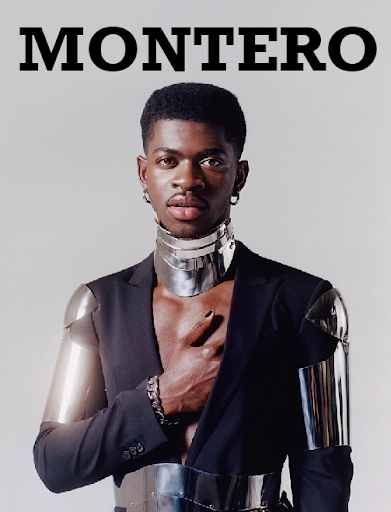Does ‘MONTERO’ Live Up To Its Namesake?

Much of Hill’s publicity has surrounded his controversial visuals. The artist teased his album with billboards of himself in the style of old TV ads. Graphic by Shreya Selvaraju.
MONTERO, Lil Nas X’s debut album, cemented him as an artist capable of delivering both great marketing and great music. The artist, whose birth name is Montero Lamar Hill, fittingly delivered the news of the album’s release in the form of a fake pregnancy announcement. Featuring Billy Ray Cyrus, Hill’s first rise to fame in 2019 came with his country collaboration Old Town Road. At the time of its release, the song was the longest-running number-one in US chart history and left many wondering if Hill would be a one-hit-wonder or one to watch.
Hill’s success quickly proved he was the latter. Shortly after Old Town Road’s explosive success, Hill released Panini, the second of three singles from his debut EP, 7. In the same year, Hill came out as gay, won two Grammys, and released a third single, Rodeo that featured Cardi B and reached 22 on the Hot 100.
Hill has an incredible grasp on marketing and using social media to stir up measured controversy and garner support. However, this often overshadows his music, as Montero’s own title track and lead single MONTERO (Call Me by Your Name) would receive simultaneous praise for its proud queer imagery and backlash for promoting “immoral” and “satanic ideology.” While the song charted well, the discussions around its music video were much louder than any praise for the music itself. This is unfortunate, because the song itself is quite good, with a chorus that gets stuck in your head for days and leaves you wanting to constantly replay the two-minute track. Lyrically, the song draws references from Call Me by Your Name, a 2017 indie film that is heralded as a piece of modern queer iconography and visually signals to FKA Twig’s cellophane, a song about the pain of racially-targeted hatred as the result of a relationship in the public eye. Hill’s inclusion of pop culture and the tribute and homage he pays to artists that paved the way for him is something that seems to stay consistent throughout both his music and his marketing.
Despite the usual energetic manner of Hill’s lyrics, DEAD RIGHT NOW showcases a new, more somber side of his music. It depicts his newfound fame and how it’s changed his relationships with people close to him. Hill sings on his mother’s alcoholism and suicidal ideation. DEAD RIGHT NOW is of the most lyrically strong and personal tracks, and it’s experimental nature and deviation from what we are used to hearing from Hill certainly paid off.
INDUSTRY BABY, the album’s third single, is everything we’ve come to expect from Hill, with a catchy hook, production, and an unexpected collaboration. In true Lil Nas X fashion, INDUSTRY BABY references Old Town Road, saying “I told you long ago, on the road, I got what they waiting for.” The song, which was produced by Kanye West and features Jack Harlow, reached virality in a way that seems incredibly familiar for Hill.
However, Hill’s somewhat formulaic approach doesn’t always serve him well. On DOLLA SIGN SLIME, which features Megan Thee Stallion, the result is underwhelming. The feature serves to Hill’s detriment, making the song feel unfinished. SCOOP, which is easily the most catchy song on the album, features Doja Cat. The pair of rapper-turned-singers complement each other extremely well, bringing an energy that DOLLA SIGN SLIME just didn’t have.
The second half of the album, denoted by a thirty-second interlude called THE ART OF REALIZATION, is much more personal, returning to the somber tone of DEAD RIGHT NOW and softening his usual flashy production for a more serious sound, that better showcases his voice.
The twelfth track on the album, VOID showcases a vulnerability we haven’t seen from Hill before. He reflects on feeling unloved and as “small as the salt in the sea.” It takes on a stripped sound, and Hill’s vocals create a sense of optimism that complements the song incredibly well.
Finally, on AM I DREAMING, Hill is joined by Miley Cyrus, and together, they deliver a calm country song that speaks to Hill’s fears of being forgotten. The song brings everything full circle to his debut, ending the album on a high note.
Hill has created an album that showcases his true talents, establishing himself as an artist that we’ll hopefully be hearing a lot more of. With writing credits on every song, Hill sang about coming to terms with himself, reclaiming Christian imagery, and his newfound celebrity identity. MONTERO facilitated Hill’s growth. From a rapper to a genre-encompassing artist, his transformation from a kid sleeping on his sister’s couch to a star is truly empowering.
It’s safe to say MONTERO certainly measured up to Hill’s reputation. The constant discussion surrounding Hill, while certainly cementing him as a public figure, left me wondering if he could really deliver on music that wasn’t propped up by a flashy marketing gimmick. While he certainly has more work to do, and I would love to hear songs from him that are more lyrically complex, Hill is still growing into who he is as an artist, and I for one cannot wait to see where it takes him.

Class of 2024
Beyond an ardent adoration of the written word, my passion for Student Press stems from how my role invariably enables me to remain acutely...





